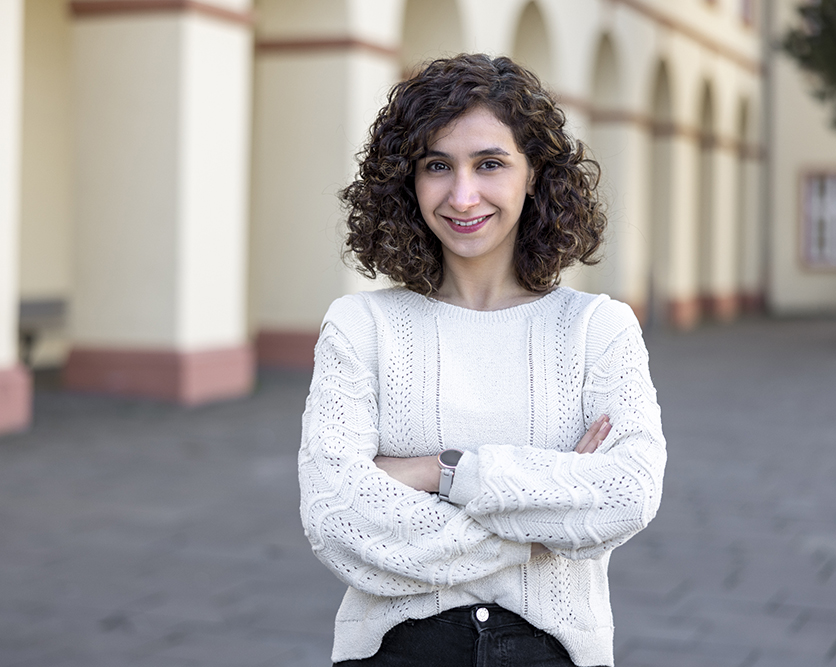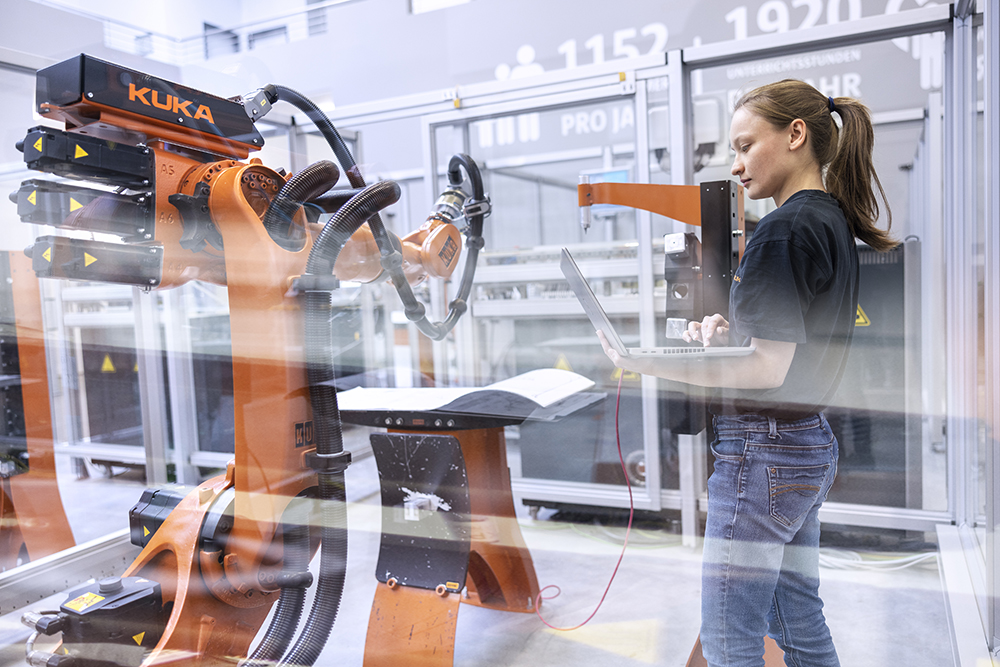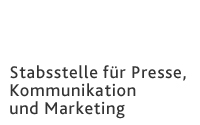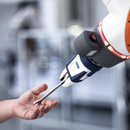Executive Department for
Press, Communication and Marketing
Adolf-Reichwein-Straße 2a Gebäude AVZ (Gebäudeteil AR-NA) 57068 Siegen
Phone: +49 (0)271/740-4915 Fax.: +49 (0)271/740-4911 E-Mail: presse@uni-siegen.de
When AI becomes a team member
How does the work environment change when smart systems take over the roles of employees? How should the systems be designed so that team members find working with them meaningful? And where do conflicts typically arise? These are some of the questions tackled by Dr. Shadan Sadeghian at the University of Siegen.
A robot arm might shudder slightly at the start of the working day, but it doesn't wish you good morning. A chatbot answers a customer query, but it doesn't stop to grab a coffee. And a software program automatically scans a bank transfer, but it has no idea what an after-work beer is. Other systems detect when important components for production are running low and order new stock in good time. They work fast and with precision, and sometimes they know more and make better connections than their human colleagues. Human-machine cooperation is automated – but not automatically conflict-free.
Of course, automated systems that support work or take over tasks can bring huge advantages. »Automation has freed up employees from lots of routine work,« says Sadeghian. She is a Junior Professor for Autonomous Interactive Systems in Faculty III. Currently, she is working on the project »Sensing and Sensibility« which looks at work satisfaction in collaboration with AI. On production lines, machines have been doing repetitive and monotonous work for decades. But today's machines are capable of much more. Systems that use artificial intelligence (AI) can process information, derive patterns from it, and act independently based on what they learn – for example by placing orders.
There are many areas where sooner or later humans will work together with robot colleagues. This changes employees' roles – and possibly also how satisfying they find their jobs. People often tell Sadeghian they're worried AI will take over their jobs. »I think it will be more about how jobs change through AI.«
 Together with Professor Dr. Marc Hassenzahl from the University of Siegen, she examined effects like this in the experiment »The Artificial Colleague« . The researchers conducted an online survey of 104 people who work with knowledge, for example programmers and scientists. The participants were asked to evaluate a fictional scenario about cooperation with an AI system. »Lots of employees think working with humans is more motivating and satisfying than working with AI,« says Sadeghian. »That can be a problem, because these technologies have the potential to fundamentally change the world of work.«
Together with Professor Dr. Marc Hassenzahl from the University of Siegen, she examined effects like this in the experiment »The Artificial Colleague« . The researchers conducted an online survey of 104 people who work with knowledge, for example programmers and scientists. The participants were asked to evaluate a fictional scenario about cooperation with an AI system. »Lots of employees think working with humans is more motivating and satisfying than working with AI,« says Sadeghian. »That can be a problem, because these technologies have the potential to fundamentally change the world of work.«
The concrete task in the experiment was to organize a meeting, including booking a time and a room, and preparing the content. One group of participants used an AI-controlled system for some of the work. After the experiment, the participants were asked to evaluate which tasks they found important and meaningful, and how satisfied they were with the result of the planned meeting. »We found it was important to most of the respondents that they took on the work they felt was important and meaningful,« says the researcher.
In a second online experiment, Sadeghian analyzed the human-AI task distribution in terms of work satisfaction with the example of shift planning for nursing staff in a hospital. »People tend to treat AI as a tool, so they feel they have to monitor its work and check the results,« she says. »But the experiment showed that people experience their work as more meaningful when they have AI on their team as a colleague.« They feel more responsible for the results and more satisfied.
However, that's not how tasks in a company are typically assigned. Sadeghian points out that intelligent and automated systems are used solely for the purpose of boosting performance and therefore profits. She says employees are seldom consulted and often just have to accept the situation. All that counts for the company is the result. »But that's not everything. The employees' work satisfaction also plays a significant role in a company's success,« says Sadeghian. Satisfied staff who feel their work makes a real difference stay loyal to the company, are more motivated, and work harder. This is another reason why the researcher studies how human-AI collaboration should be designed so that people still find their jobs satisfying and fulfilling.
 Job satisfaction depends on various factors. »People want to experience a sense of achievement, get on well with colleagues, and take pride in their performance and capabilities,« says Sadeghian.The study also revealed that people are happier if they feel they have control over their work and results. »But we don't know what it means to be proud of the joint results from a human-AI collaboration when the AI system itself can't feel pride.«
Job satisfaction depends on various factors. »People want to experience a sense of achievement, get on well with colleagues, and take pride in their performance and capabilities,« says Sadeghian.The study also revealed that people are happier if they feel they have control over their work and results. »But we don't know what it means to be proud of the joint results from a human-AI collaboration when the AI system itself can't feel pride.«
In today's world, the potential applications for AI systems are rapidly expanding beyond tasks like planning rosters in hospitals or factories. »AI systems will likely become increasingly important in other fields as well, such as journalism and design,« says Sadeghian. Humans will probably still play an important part in producing results. But this could dramatically alter their tasks. A journalist who currently writes their own copy may, in the future, check the accuracy of AI-generated texts. »The all-important question is: if work changes in this way, what will happen to job satisfaction?« says Sadeghian. An AI system might seem more capable of a certain task, so it takes over the part of the job a person enjoyed most. That can be a problem.
»It's always important which party does what tasks to ensure people feel they contribute meaningfully to the result,« says the researcher. However, working with AI doesn't inevitably cause problems. If it is applied for the right purposes, it can even boost job satisfaction. »A good example would be somebody who learns special skills in using AI,« says Sadeghian. »This could be very fulfilling.«
»Sensing and Sensibility«
Funding body: University of Siegen
Amount: EUR 650,000
Funding period: 2020-2023
Coordinators: Prof. Dr. Marc Hassenzahl (School III), Prof. Dr. Peter Burggräf (School IV) and Prof. Dr. Carolin Gerlitz (School I)
Author: Maria Berentzen
Photos: Sascha Hüttenhain
This article was first published in our research magazine future.


